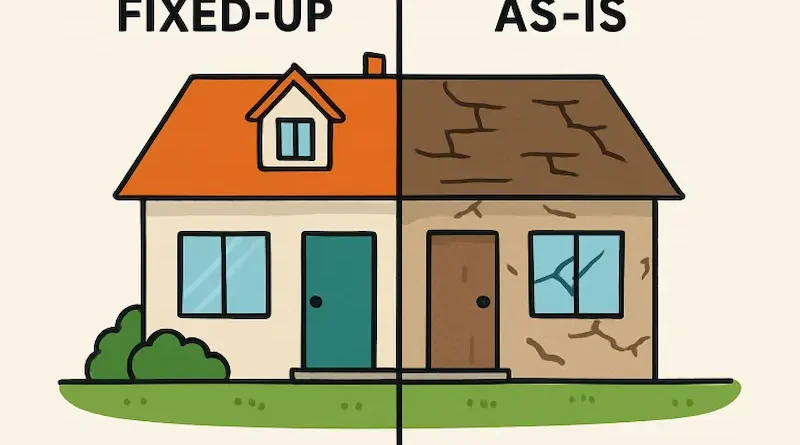The Pros and Cons of Selling Your Home As-Is
Selling your home can be daunting, especially when it comes to preparing your property for the market. Selling as-is offers a streamlined alternative for homeowners seeking to avoid costly repairs or lengthy renovations. But before you make this decision, it’s crucial to weigh its benefits and drawbacks. If you’re considering this option in the Nashville area, you might want to explore services like https://www.dignityproperties.com/we-buy-houses-nashville-tn/, which specialize in buying homes as-is for a quicker sale.
Selling as-is can seem appealing for those looking for convenience and speed, but crucial financial and legal factors must be considered. While you avoid the hassle of upgrades, you may face reduced offers or a limited buyer pool. Let’s examine the critical aspects of this approach below so you can make the best decision for your situation.
Many sellers also find reviewing broader market trends and professional advice helpful before committing to an as-is transaction. Doing your homework—and knowing when a quick sale is the right move—can ultimately save you time, money, and stress.
Suppose you want to learn more about selling strategies, options, and alternatives. Companies like https://www.dignityproperties.com/ provide resources and guidance for all types of sellers, from fixer-uppers to homeowners needing a fast cash offer.
What Does Selling As-Is Mean?
Selling your home as-is means listing your property without making any repairs or upgrades, and offering it to buyers in its current state. The new owners accept responsibility for any faults, damage, or deferred maintenance at closing. This strategy is common among those who don’t have the resources to fix their property or want a swift, hassle-free sale. According to Realtor.com, as-is sales benefit older homes or properties requiring significant renovation.
Pros of Selling Your Home As-Is
1. Faster Sale Process
Skipping the repair process means putting your home on the market much sooner. This can be vital if you need to relocate quickly or want to avoid holding costs such as mortgage payments, property taxes, and utility bills. The speed of as-is transactions is one of the primary reasons sellers choose this option.
2. Cost Savings
One of the main appeals of selling as-is is avoiding the expense of renovations. Whether your home needs cosmetic sprucing or major work, selling as-is removes the need for sellers to spend money upfront. This can relieve owners who are dealing with financial constraints or facing costly repairs.
3. Attracting Real Estate Investors
Homes sold as-is often attract investors and cash buyers who are comfortable with properties needing work. Investors typically look for homes where they can add value before reselling or renting, which can lead to quicker and less complicated transactions.
Cons of Selling Your Home As-Is
1. Lower Sale Price
Homes sold as-is usually fetch lower prices than those updated or maintained. Buyers are likely to factor the cost of repairs into their offer, which can lead to lower net proceeds for the seller. Pennymac notes that negotiations can be more arduous, with buyers using needed repairs as leverage for further reductions.
2. Limited Buyer Pool
Most traditional buyers prefer move-in-ready homes and might be discouraged by repairs or updates required. As a result, your pool of potential buyers could be smaller, and your home may stay on the market longer than comparable move-in-ready properties.
3. Buyer Financing Hurdles
Financing can be challenging for buyers interested in as-is homes, especially if the property has significant issues like a damaged roof or non-functioning systems. Many lenders won’t approve a mortgage for a house with significant defects, which can further limit your buyer options.
Legal Considerations and Disclosures
Even when selling as-is, sellers are legally obligated to be upfront about known issues. It’s a common misconception that “as-is” means you have no responsibilities. Disclosure laws vary by state, but failing to reveal defects can result in legal action after the sale. To protect yourself, complete all required paperwork and be honest about the property’s condition. Consult legal or real estate professionals to stay compliant and avoid potential lawsuits.
Tips for Selling Your Home As-Is
- Conduct a Pre-Listing Inspection: A professional inspection before listing can help you understand what buyers will find, and prepare you for disclosures and negotiations.
- Set the Right Price: Work with your agent to price your home competitively, reflecting its condition and local market trends. Overpricing can scare off buyers while underpricing leaves money on the table.
- Be Transparent: Openly share all known issues with purchasers. Transparency builds trust and can prevent future legal troubles.
- Market to the Right Audience: Target investors, flippers, and buyers looking for fixer-upper opportunities. Highlight your property’s strengths and potential for improvement.
Conclusion
Selling your home as-is can benefit sellers who value speed, convenience, and cost savings over maximizing sale price. However, it often involves accepting a smaller buyer pool and lower offers. It’s essential to fulfill your legal disclosure responsibilities and market your property strategically. By understanding the pros and cons and using the right resources, you can decide if selling as-is is the best choice for your unique circumstances.

